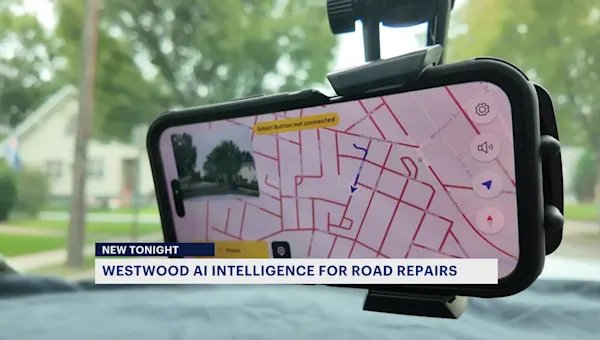AI Insights
Westwood joins 40 other municipalities using artificial intelligence to examine roads

The borough of Westwood has started using artificial intelligence to determine if their roads need to be repaired or repaved.
It’s an effort by elected officials as a way to save money on manpower and to be sure that all decisions are objective.
Instead of relying on his own two eyes, the superintendent of Public Works is now allowing an app on his phone to record images of Westwood’s roads as he drives them.
Data on every pothole, faded striping and 13 other types of road defects are collected by the app.
The road management app is from a New Jersey company called Vialytics.
Westwood is one of 40 municipalities in the state to use the software, which also rates road quality and provides easy to use data.
“Now you’re relying on the facts here not just my opinion of the street. It’s helped me a lot already. A lot of times you’ll have residents who just want their street paved. Now I can go back to people and say there’s nothing wrong with your street that it needs to be repaved,” said Rick Woods, superintendent of Public Works.
Superintendent Woods says he can even create work orders from the road as soon as a defect is detected.
Borough officials believe the Vialytics app will pay for itself in manpower and offer elected officials objective data when determining how to use taxpayer dollars for roads.
AI Insights
AI prompt injection gets real — with macros the latest hidden threat

“Attackers conceal instructions via ultra-small fonts, background-matched text, ASCII smuggling using Unicode Tags, macros that inject payloads at parsing time, and even file metadata (e.g., DOCX custom properties, PDF/XMP, EXIF),” Granoša explained. “These vectors evade human review yet are fully parsed and executed by LLMs, enabling indirect prompt injection.”
Countermeasures
Justin Endres, head of data security at cybersecurity vendor Seclore, argued that security leaders can’t rely on legacy tools alone to defend against malicious prompts that turn “everyday files into Trojan horses for AI systems.”
“[Security leaders] need layered defenses that sanitize content before it ever reaches an AI parser, enforce strict guardrails around model inputs, and keep humans in the loop for critical workflows,” Endres advised. “Otherwise, attackers will be the ones writing the prompts that shape your AI’s behavior.”
AI Insights
Mapping the power of AI across the patient journey

Artificial intelligence (AI) is rapidly transforming clinical care, offering healthcare leaders new tools to improve workflows through automation and enhance patient outcomes with more accurate diagnoses and personalized treatments. This resource provides a framework for understanding how AI is applied across the patient journey, from pre-visit interactions to post‑visit monitoring and ongoing care. It focuses on actionable use cases to help healthcare organizations evaluate AI technologies holistically, balance innovation with feasibility, and navigate the evolving landscape of AI in healthcare.
For a deeper exploration of any specific use case featured in this infographic, check out our comprehensive compendium. It offers detailed insights into these technologies, including their benefits, implementation considerations, and evolving role in healthcare.
AI Insights
West Alabama school district looks to strengthen AI policy

TUSCALOOSA, Ala. (WBRC) – One west Alabama school district is working to update its policy on artificial intelligence (AI).
Tuscaloosa City Schools wants to hear from parents when it comes to how they handle AI, a growing system that continues to evolve.
The school district has a committee studying best-use practices and a major part of that study is surveying parents on how they think AI could be strengthened to improve teaching and learning.
Central High School English teacher Rachael James is the first to admit just the mere mention of AI intimidated her a bit.
“There is definitely that intimidation factor,” said James.
But AI is here to stay, and James felt the best way to tackle it is to confront it head on with crystal clarity.
James learned early on that for teachers, AI is simply another resource – another avenue – to find apps that help do their jobs better.
“AI allows us to create different tools to address different learning styles and it also makes some of the legwork in education a little easier with creating lesson plans we need to run our classes smoothly,” said James.
But like any new thing, there is a chance it could be abused and harmful.
“Safety and privacy are most important,” said Tuscaloosa City Schools Superintendent Dr. Mike Daria.
Dr. Daria says the school district is sending out surveys to parents to get their feedback on how to make the use of AI better, stronger and safer in the classroom.
“We know it’s evolving very quickly and we believe it’s important to have input from our parents on the way we use it. A big part of that is AI literacy so our students can understand AI, navigate it, interpret it, discern what it is and what it’s not,” said Dr. Daria.
But what about the teacher-student relationship? Could artificial intelligence damage the synergy?
“There is that fear. However, being able to educate, even if computers take over, there still has to be human engagement in some shape, form or fashion,” said James.
Either way, the future is here and James is on the front line and mastering it along the way.
“The goal is not to be afraid of AI,” said James.
School district leaders said parents have until September 26 to complete the survey.
Get news alerts in the Apple App Store and Google Play Store or subscribe to our email newsletter here.
Copyright 2025 WBRC. All rights reserved.
-

 Business2 weeks ago
Business2 weeks agoThe Guardian view on Trump and the Fed: independence is no substitute for accountability | Editorial
-
Tools & Platforms4 weeks ago
Building Trust in Military AI Starts with Opening the Black Box – War on the Rocks
-

 Ethics & Policy2 months ago
Ethics & Policy2 months agoSDAIA Supports Saudi Arabia’s Leadership in Shaping Global AI Ethics, Policy, and Research – وكالة الأنباء السعودية
-

 Events & Conferences4 months ago
Events & Conferences4 months agoJourney to 1000 models: Scaling Instagram’s recommendation system
-

 Jobs & Careers2 months ago
Jobs & Careers2 months agoMumbai-based Perplexity Alternative Has 60k+ Users Without Funding
-

 Podcasts & Talks2 months ago
Podcasts & Talks2 months agoHappy 4th of July! 🎆 Made with Veo 3 in Gemini
-

 Education2 months ago
Education2 months agoVEX Robotics launches AI-powered classroom robotics system
-

 Education2 months ago
Education2 months agoMacron says UK and France have duty to tackle illegal migration ‘with humanity, solidarity and firmness’ – UK politics live | Politics
-

 Funding & Business2 months ago
Funding & Business2 months agoKayak and Expedia race to build AI travel agents that turn social posts into itineraries
-

 Podcasts & Talks2 months ago
Podcasts & Talks2 months agoOpenAI 🤝 @teamganassi





















